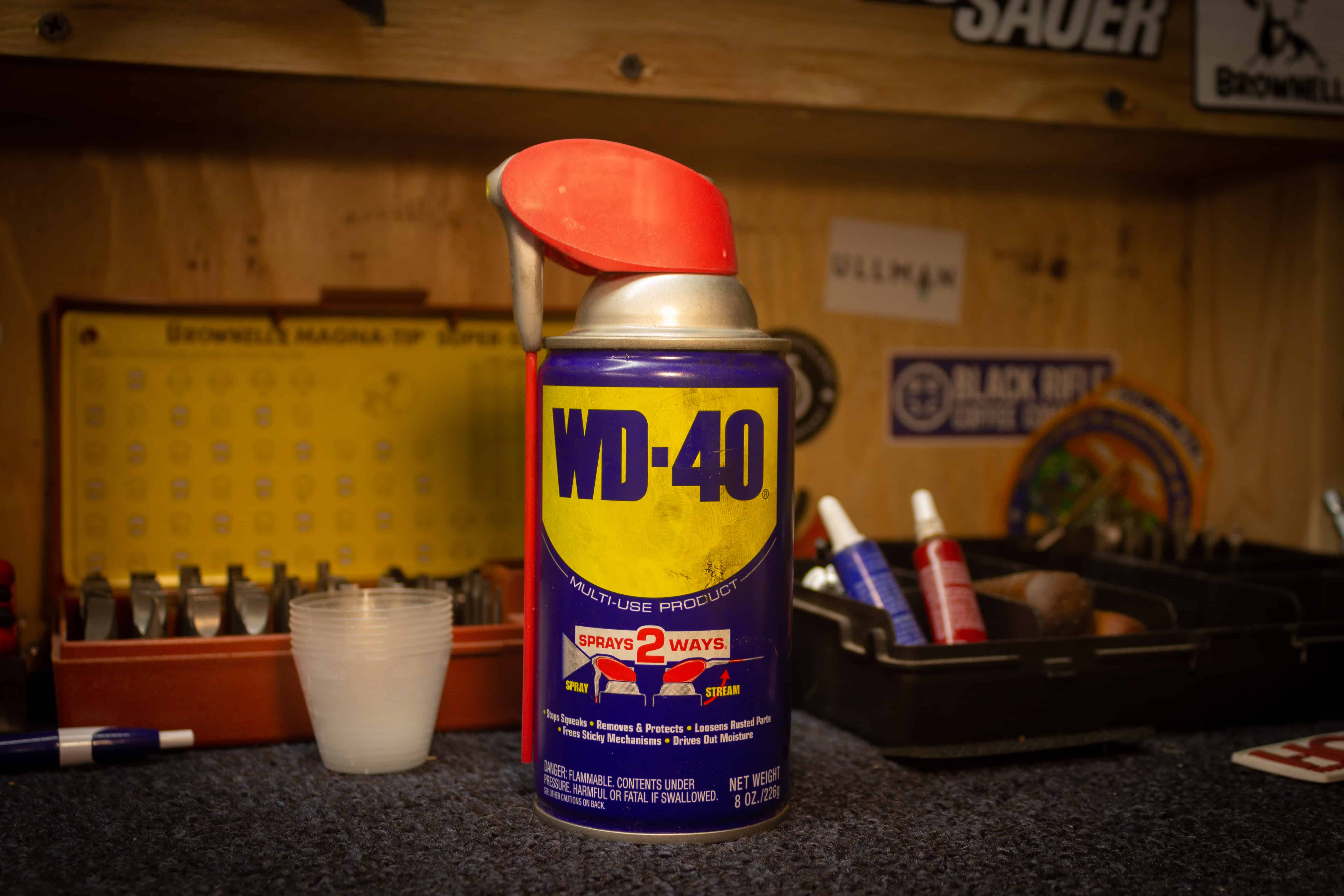
I grew up soaking guns with WD-40. It’s just what we did. While it did slick them up and make even the roughest actions feel smooth, they needed to be thoroughly cleaned after each outing. I thought this was normal. I simply didn’t know any better.
WD-40 will dissolve dirt and grime in your gun but won’t remove it. It evaporates rather quickly, leaving the residue behind and gumming up the moving parts. WD-40 should only be considered when a gun has been exposed to extreme amounts of moisture. Even then, it must be removed and replaced with a good gun oil.
While the can of WD-40 on the shelf in the garage may be convenient, it should be avoided when cleaning your gun. Let me explain why.
Affiliate Disclosure: This article may contain affiliate links. When you use these links, I earn a small commission from each sale generated at no cost to you. This commission helps me continue to put out free content. I work a full-time job that I am very happy with; therefore, I don’t need this commission and am not obligated to speak highly of any product. Everything written is my own opinion: the good, the bad, and the ugly.
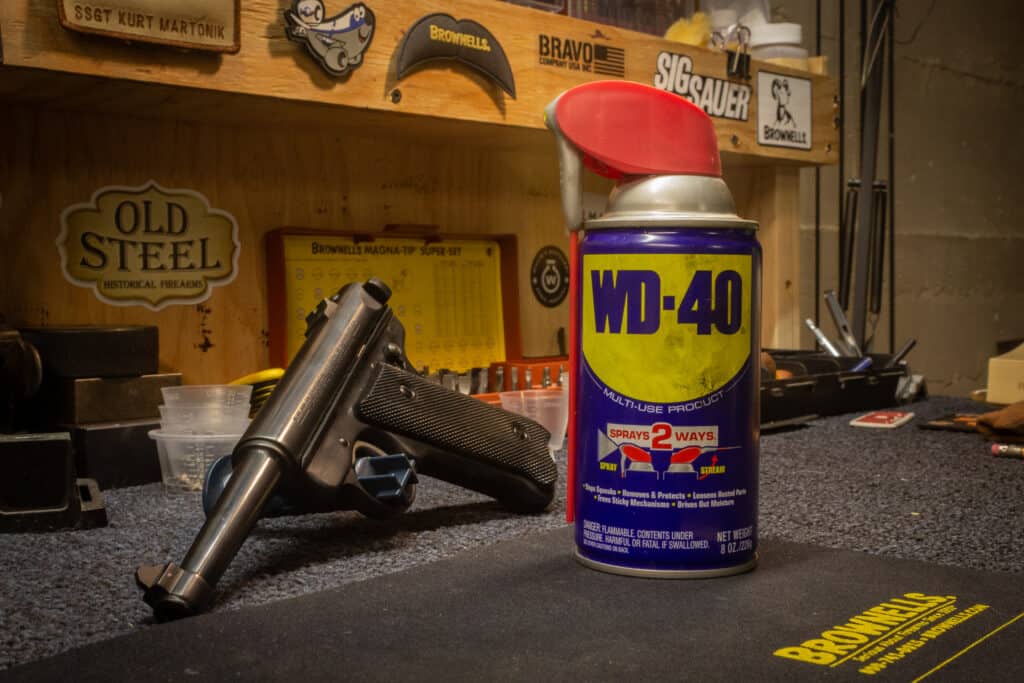
What is WD-40
WD-40 is one of those household items found in almost every home across America. Introduced in 1953, it was originally designed as a solvent and degreaser for the aerospace industry. The “WD” stands for “Water Displacement,” referring to its primary use. The team at the Rocket Chemical Company got the legendary formula right on their 40th try, hence the name WD-40.
WD-40 is a solvent that penetrates and protects metal from rust and corrosion. Although it is sometimes advertised as a lubricant, it is a very poor one for use on guns.
Use coupon code KTG10 to get 10% off your order of $150 or more at Brownells.
The ingredients that make up the iconic formula are still unknown. While some believe it is a mixture of Decane, Nonane, Dimethyl Naphthalene, and CO2, the true formula has never been released. The inventors of WD-40 even decided against getting a patent as they didn’t want to publish their secret recipe.
Today, WD-40 is more than one product and encompasses a whole line of products. For this article, we are only going to refer to the original multi-use product that is found in every garage. It is no secret that WD-40 is an excellent product, but it isn’t the right choice for cleaning guns.
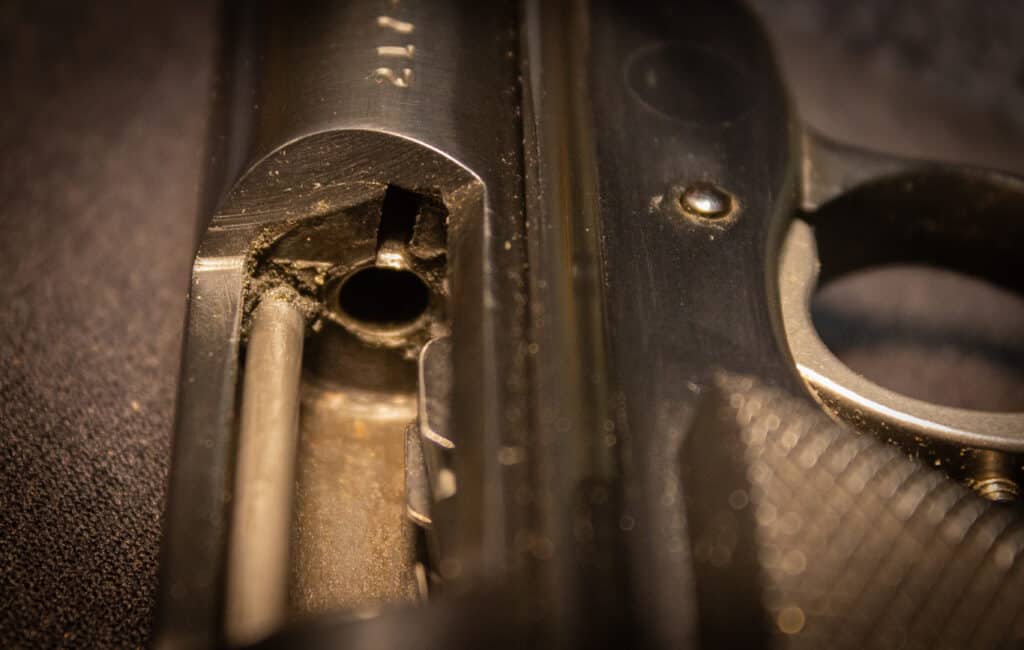
Why You Shouldn’t Use WD-40 on Your Gun
The availability of WD-40 made it a popular choice amongst gun owners of yesteryear. Many of these men and women would open the action of their favorite pistol, spray the insides with WD-40, work the action a few times and call it good. Yes, it will feel nice and smooth after doing this. However, that will be very short lasted and will cause your gun to get excessively dirty.
WD-40 will dissolve the dirt and grime inside your gun and cause it to build up. WD-40 evaporates rather quickly, leaving the fouling behind in the cracks and crevices of your gun. A gun cleaned with WD-40 will be much dirtier than a gun cleaned with a quality CLP(Clean, Lube, Protect).
The excess fouling caused by the use of WD-40 can also cause malfunctions in the operation of your firearm. As stated before, the fouling is dissolved and then runs into other places of the gun, where it stays until removed by a combination of nylon brushes and cotton swabs.
WD-40 is not a lubricant. There is no arguing that WD-40 will slick up any firearm action and make it feel smooth. However, that smoothness is short-lived as it is a very poor lubricant. It evaporates too quickly, leaving a film on the parts that actually attracts dirt and debris.
While it shouldn’t be used to clean a firearm day to day, there are a few situations that WD-40 is the right choice.
When Is It Ok to Use WD-40 on Firearms
Now that I just got done telling you why you shouldn’t use WD-40 on your guns, let me explain some different scenarios where it could be considered a good option.
WD-40 was designed to work as a water displacement solvent and still works really well in this application. What does this mean for the gun owner? If your firearm is exposed to a lot of moisture, WD-40 is a great option, whether after a day hunting in a rain storm or falling into a river while fishing with a pistol on your hip. If this is the case, spray the firearm inside and out with WD-40 at the first available opportunity. Let it sit for an hour or two, then remove the WD-40 and oil the gun with a satisfactory gun oil.
WD-40 is a convenient option for removing cosmoline from a gun. The solvent quickly removes the thick grease preservative and leaves you with a relatively clean gun. If going this route, follow this up with the use of a good solvent then gun oil. If you are interested in reading more about removing cosmoline, check out my article, What Is Cosmoline and How to Remove It.
Yes, there are applications for WD-40 in the firearms world. However, as you can see, these are very situation-dependent. There are too many good gun oils on the market to settle for WD-40 as a general cleaner for everyday use.
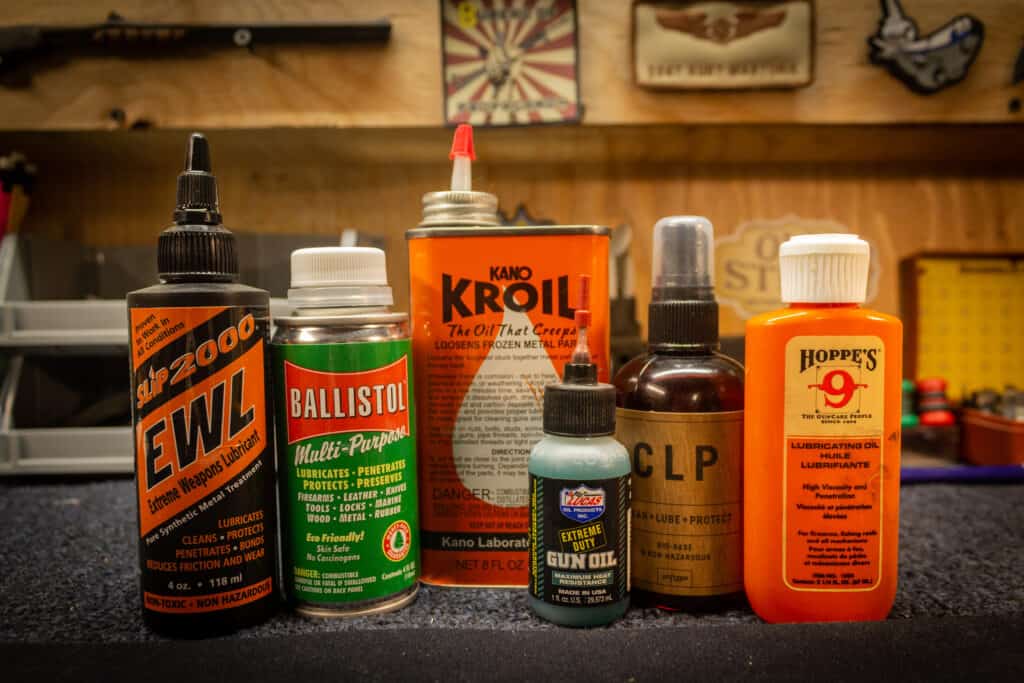
What You Should Clean Your Gun With
Clean your guns with something that is marketed towards guns. Yep, you read that right. Gun oils and solvents may seem like a gimmick to some, but they are optimized for use in firearms. This optimization is primarily found in the viscosity and formula of the oil.
I’m not trying to sell you on any gun or brand in particular. Find something that works for you and use it. Remember that the oil that works great in your AR-15 may not be ideal for your bolt action hunting rifle. Fortunately, the gun industry has come a long way with the advances in oils and solvents. While some may work better than others for certain applications, all of them work better than WD-40. There is no shortage of good gun oils and solvents on the market.
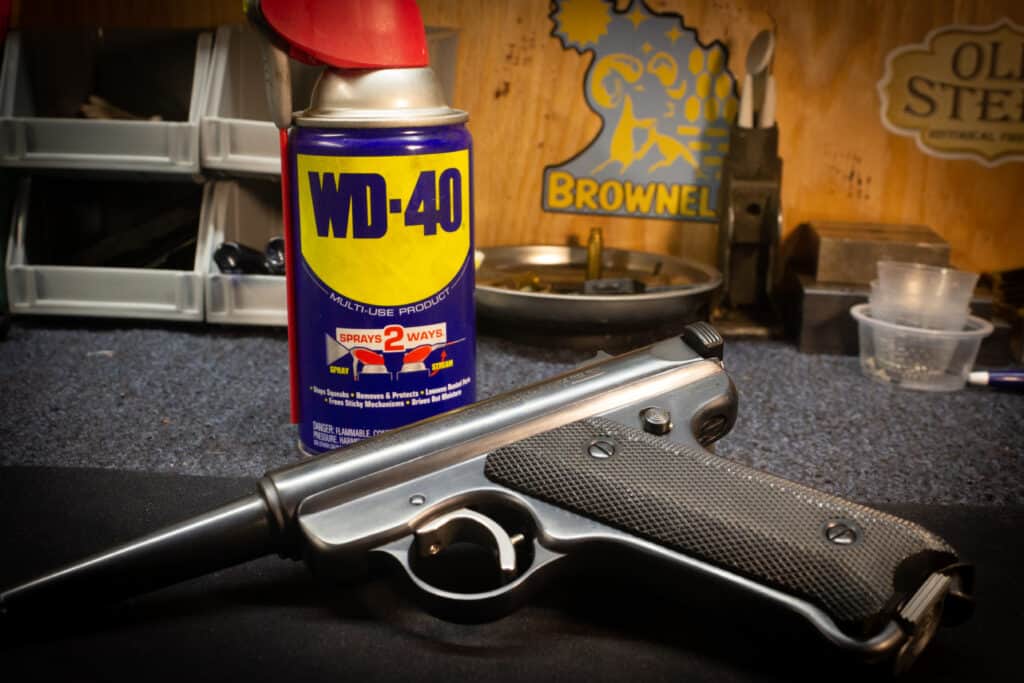
Final Thoughts on the Subject
The truth is, I love WD-40. But not for my guns. As a gunsmith, I can easily identify when someone used WD-40 to clean their gun. There will be dark-colored gunk in just about every crevice and corner of the gun. It will be everywhere.
Yes, you can use WD-40 to clean your gun if you really want to. But it isn’t worth it when there are much better options on the market for the same price. Buy a good gun solvent and gun oil, and leave the WD-40 in the garage.
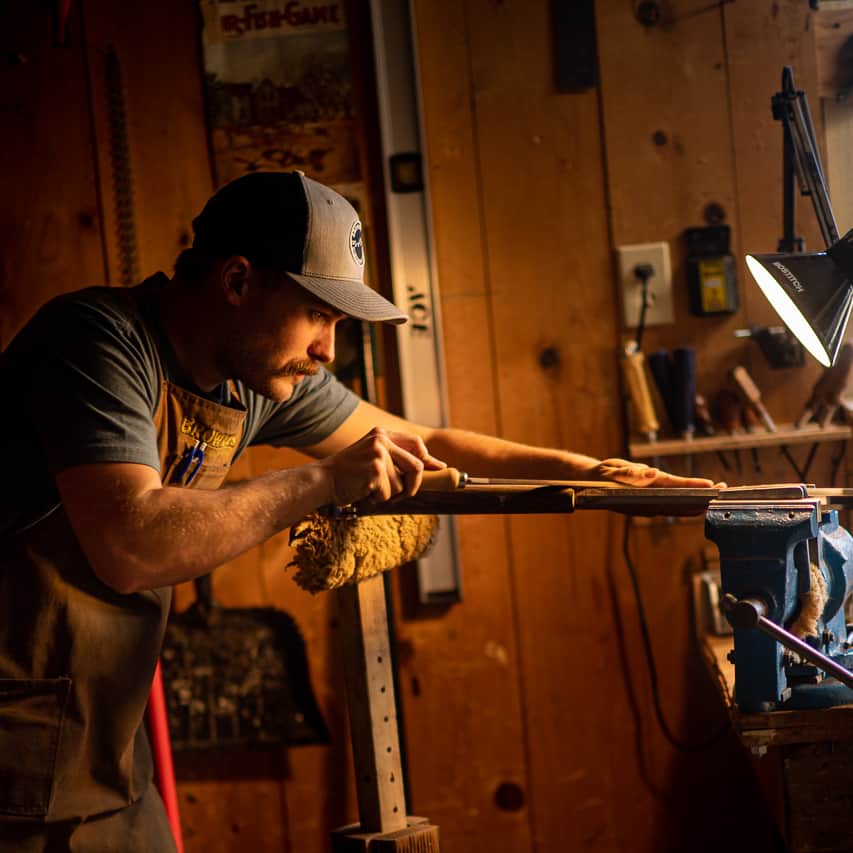
Written by: Kurt Martonik
Kurt is a Gunsmith, Reloader, Hunter, and Outdoorsman. He grew up in Elk County, Pennsylvania, where he became obsessed with the world of firearms. Following high school, Kurt enlisted in the United States Air Force as a Boom Operator, where he eventually rose to the position of Instructor. After his military service, he attended the Colorado School of Trades(CST) in Lakewood, CO for gunsmithing. Following graduation, he accepted a job at C. Sharps Arms in Montana, where he worked as a full time stockmaker and gunsmith.